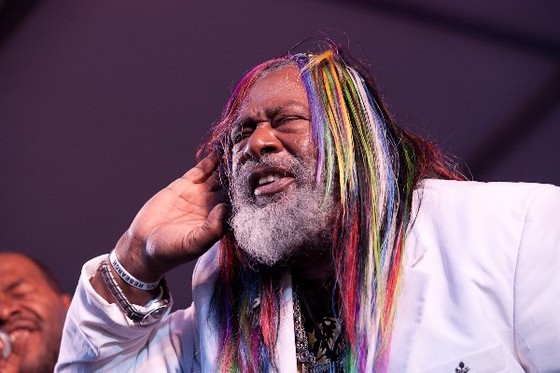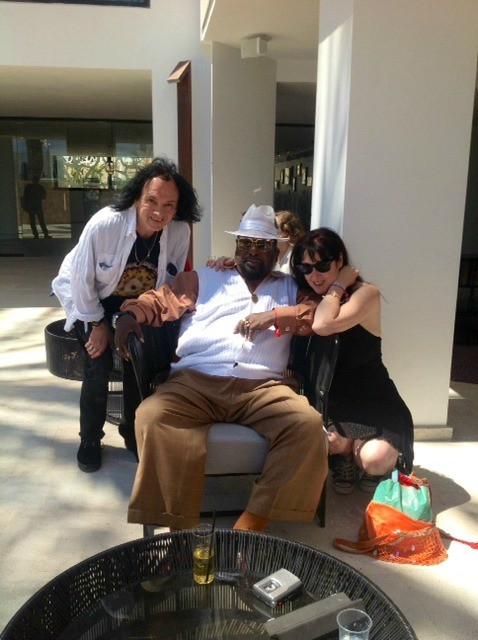
[Editor's Note: Kris Needs is the author of “George Clinton and the Cosmic Odyssey of the P-Funk Empire,” Clinton's first in-depth biography. It was released in June on Omnibus Press. Needs wrote this essay about Clinton's cultural impact exclusively for Heard Mentality.]
By: Kris Needs
Let me tell you all about the one and only George Clinton, who can be placed alongside James Brown, Jimi Hendrix and Sly Stone as the most visionary and influential black music pioneer to emerge from the incendiary 1960s but is now the only one of those figureheads still taking it to the stage.
While America was embroiled in war and socio-cultural revolution during the '60s, Clinton was reinventing funk by mating it with rock and changing rock by mixing it with funk, giving birth to the influential psychedelic soul style that has made him the most sampled artist in hip-hop. His synthesized funk of the late 1970s and early '80s created a new strain of techno-soul that laid the foundations for today's electronic dance music.
]
But Clinton's colossal impact on popular music is often overshadowed by his infamous and outrageous reputation and antics. Known for getting naked onstage, recording studio albums while tripping on LSD and emerging in incredible costumes from huge, illuminated spaceships on stage during his arena shows in the 1970s, Clinton's music has often taken a back seat to his actions.
From guitarists sporting oversize nappies to kamikaze drug-guzzling contests, Clinton's seven-decade story is dominated by tales of unfettered excess and marked by moments of incredible musical brilliance.
Clinton's far-reaching influence is clearly seen in much of the music of today: the powerful electronic groove by P-Funk in “Flash Light” (released in 1977) marked the beginning of disco music's evolution into boogie, served as a foundation for Prince's breakthrough releases of the 1980s, and was the musical basis for the New York electro and early Detroit techno music trends.
Once deemed strange and quirky, Clinton's influence is now main stream. Stoked by P-Funk, dance movements started around the world beginning in 1982 with Afrika Bambaataa's 'Planet Rock' and have permutated through today, most notable in influencing the most popular music of the 1990s that drew deeply from the Clinton discography including N.W.A. Ice Cube, Dr Dre's (his gangsta-funk, genre-defining The Chronic album even featured a video containing the Mothership landing footage) and Snoop Dogg's massive selling Doggystyle, among many others.
In 1989, Clinton mused on the future of rap and hip-hop in an ironic and prescient way.
“Rap has really saved The Funk but it's the DNA for hip-hop. We put our own DJs on the records and that was like the birth of hip-hop….Chuck and Flavor listened to the Parliament live LP from beginning to end and they've said that…I'm their mentor and that came at a good time because I was giving up,” he said.
“Now I feel so good. I don't mind if they sample me because I get back more than they do….I get paid in a different way because I know how to appreciate the fact that they used the music. If they're hot with the kids and the kids like them then they'll like me. Everyone's into the “One Nation Under A Groove” concept. So I'm glad they sample the shit….now if I took 'Knee Deep' to the radio stations they'd tell me it sounds like De La Soul!”
[

At that interview (25 years ago!), I asked him what the Cinderella Theory meant since it was the title of his album being released at the time and his answer was personally revealing. “It's…a concept: how I love the pop star philosophy, all the high marketing and publicity, then after 12 o'clock I turn into the Funky Nasty Dude. I'm on a mission. I agree to be the pop star for publicity reasons. But after midnight I turn into a nasty dog.”
A quarter century later and approaching his 73rd birthday, the Nasty Dog is on a new mission to reclaim those tracks he was flattered to have hijacked 25 years ago. Headlining major funk music festivals and performing to huge audiences throughout the US, Canada and Europe, he is certainly getting the credit and recognition he deserves from audiences even if it may be lacking among some cognisenti and business affairs attorneys.
Asked whether he got paid for the samples he created that built hip-hop music, he confesses it remains a sore subject because it relates to his failures as a young artist trying to create a musical genre.
As the old saying goes, the pioneer is the one with all the arrows in his back. Although that is appropriate in Clinton's case, it also reveals something about a matured George Clinton. As he puts it today, “That's what made me start doing drugs! It took me 72 years to find that out….Now it's publishers, record companies…Instead of a drug habit I got a lawyer habit.”
Along with a relentless gigging schedule, and working to resolve numerous long-standing legal issues, Clinton is also developing of a reality TV show called “The Clintons,” recording and producing a new album and completing his autobiography, titled Brothers Be Like 'George, Ain't That Funkin' Kind Of Hard On You?': A Memoir By George Clinton
Clinton really has nothing to prove except gaining back his past achievements on paper. His legacy is immense and what Clinton has contributed to the music people listen and dance to today is nearly beyond compare.
That's why George Clinton matters: because he put our world under a groove.
And on stage or off, he'll invariably be cackling: “I'm a dog” as his parting shot.
See also
10 Punk Albums to Listen to Before You Die
10 Goriest Album Covers
10 Most Satanic Metal Bands
Follow Heard Mentality on Twitter and Facebook!

